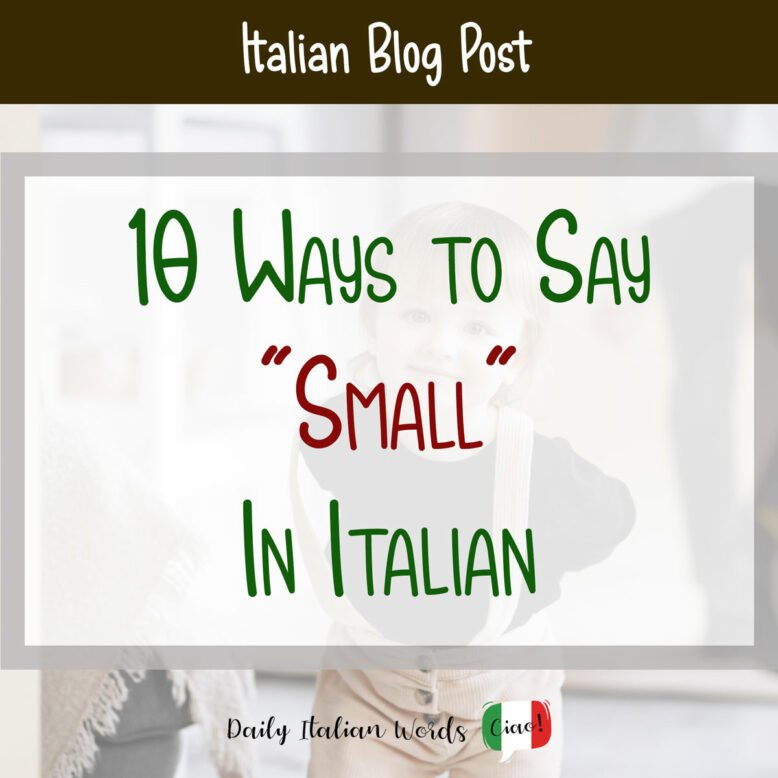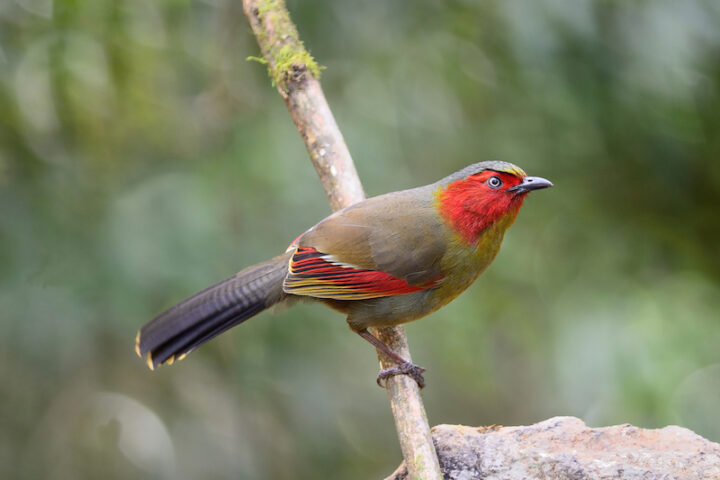When it comes to describing something small in Italian, there’s a delightful variety of words at your disposal. Whether you’re referring to a tiny object, a cute little creature, or limited statures, the Italian language has a term that captures the nuance you’re aiming for.
So, let’s dive into ten great ways to say “small” in Italian, starting with the ever-popular piccolo and moving through a spectrum of expressions that will make your conversations richer!

1. Piccolo (small)
English equivalent: small
Piccolo is the most common way to say small in Italian, you’ll hear it everywhere. It’s perfect for describing anything from a minor inconvenience to a compact height:
Devo risolvere un piccolo problema.
I need to fix a small problem.
È piuttosto piccola per la sua età.
She’s fairly short for her age.
Piccolo can also take on a playful twist when referring someone or something that reminds of a well-known person or place, but in miniature form:
Matteo è già un piccolo Steve McCurry, adora fare foto!
Matteo is already a little Steve McCurry, he adores taking pictures!
Questo paese è soprannominato la piccola Firenze.
This village is dubbed the little Florence.
Piccolo also appears in various idiomatic expressions, adding colour and nuance to conversations.
- Com’è piccolo il mondo! (It’s a small world!) – perfect for when you bump into someone you know in the most unexpected place.
- Nel mio piccolo (In my small way) – use this to express that you’re doing your best with what you have, no matter how small.
- In piccolo (In small letters) – perfect for those times when you need to emphasize the fine print.
- Pesce piccolo (Small fish) – this refers to someone with little power or a minor role, often in shady situations.
- Pesce grosso (Big fish) – the opposite of pesce piccolo, this refers to someone who holds significant influence or power.

2. Piccolino
English equivalent: very small
If piccolo is small, piccolino is adorably small! This affectionate diminutive is what you’d use when you’re cooing over a baby, gushing over a puppy, or just admiring something that’s tiny and sweet:
Ma che bello questo piccolino, come si chiama?
How adorable is this little one, what’s his name?
3. Piccino
English equivalent: tiny
Piccino is another cute way of saying small in Italian. It’s often used to talk about young children, tiny animals, or anything that deserves an extra dose of cuteness. To highlight just how small and sweet something, Italians often double the word, resulting in expressions like piccino piccino or piccino piccino picciò that are perfect for bedtime stories.
C’era una volta un bimbo piccino piccino che aveva perso il suo pupazzo preferito.
Once upon a time, there was a tiny little boy who had lost his favorite stuffed toy.
Piccino can also be used as a noun, doubling as a cute synonym for child, for instance:
L’evento di domani è aperto a grandi e piccini.
Tomorrow’s event is open to adults and children alike.

4. Minuscolo
English equivalent: minuscule
Minuscolo is your go-to word when you want to talk about something really, really small, like those tiny lowercase letters:
L’indirizzo e-mail deve essere scritto in minuscolo.
The email address must be written in lowercase.
It’s also great for adding a dash of humor or sarcasm to your descriptions. Imagine receiving a gift and saying, Mi ha regalato un ciondolo minuscolo, si è sprecato! (He gave me a tiny pendant, how generous of him!).
5. Microscopico
English equivalent: teeny-weeny
Ever seen something so tiny that you almost miss it entirely? In Italian, you can describe this as microscopico! The word comes straight from microscopio (microscope), hinting that whatever you’re talking about is so itty-bitty, you’d need a microscope to spot it!
Siamo finiti in un paese microscopico, dove non c’è nemmeno un posto per mangiare!
We ended up in a teeny-weeny village where there isn’t even a place to eat!

6. Impercettibile
English equivalent: imperceptible
If something is so subtle that it practically slips under the radar, you would call it “impercettibile.” This adjective is perfect for describing anything that’s not just visually tiny but also too subtle for any of your senses to detect.
Tranquilla Anna, la differenza tra le due copie è impercettibile, nessuno la noterà.
Don’t worry, Anna, the difference between the two copies is imperceptible, no one will notice.
7. Angusto
English equivalent: narrow
Ever been in a space so tight it feels like the walls are closing in? That’s when you need the word angusto! This adjective is your go-to when describing something uncomfortably cramped, almost suffocating:
Ci hanno dato una camera angusta, senza nemmeno una finestra.
They gave us a narrow room, without even a window.

8. Minuto
English equivalent: tiny
If you want to describe someone who’s delicately petite, minuto is the word for you. This adjective refers to a person’s small build, like when someone is just the right size to fit into tight spaces or be effortlessly graceful. Synonyms like esile (slender) and mingherlino (puny) add some variety:
A Carlo piacciono le ragazze minute, io sono troppo alta per lui.
Carlo likes petite girls, I’m too tall for him.
9. Basso
English equivalent: short
When height isn’t exactly towering, basso steps in! Whether you’re talking about yourself, someone else, or an object, this adjective gets the job done. Just a heads-up – be mindful of the context, as basso can sometimes be a touchy subject for some.
Io sono più bassa di mia sorella.
I’m shorter than my sister.
Basso is also commonly used for talking about something of low value or small quantity. For instance, if you’re talking about a bargain deal, you’d say un prezzo basso (a small price).
10. Modesto
English equivalent: modest
Modesto helps describe something that’s small or humble. It’s often used to talk about situations where resources are limited, or accomplishments are understated, but it still carries a sense of quiet dignity:
Ha uno stipendio modesto, ma non ha mai fatto mancare niente ai figli.
He has a modest salary, but he’s never failed to provide for his children.

Valentina Nicastro is a travel writer in love with her home country, Italy. Having travelled widely around the globe, she realised there was more to explore closer to home and decided to put the passport aside for a while. When she is not immersed in documenting Italy, you’ll find her donning her communication consultant hat, weaving words as a content writer and bridging linguistic divides as a translator.


